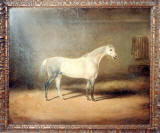|
James Howie 1791-1858 Early Photographer |
|
Please select a topic, or scroll down this page: |
|
Animal & Portrait Painter |
|
James Howie James Howie was born in Brechin, Forfarshire in 1791. [Obituary: The Scotsman: 29 Dec 1858] He moved to Edinburgh, becoming an animal and portrait painter in 1823, based first at 8 North Bridge, then at several addresses in Princes Street. He exhibited around a dozen paintings at the Royal Scottish Academy exhibitions between 1823 and 1834. Here is one of his later paintings. |
|
James Howe NOTE: Do not confuse this James Howie, Animal and Portrait Painter and early photographer, with the more famous Edinburgh Portrait, Animal and Historical Painter, James Howe (1780-1836). In fact, James Howe sometimes signed himself, James Howe. [John Malden, The Paxton Trust, Berwick-upon-Tweed] James Howe was born in Skirling, Peeblesshire. He was apprenticed to the Norie family in Edinburgh. He travelled to London in 1806 but failed to get royal patronage so returned to Edinburgh where he worked for most of his career. He painted animal subjects and also huge panoramas of the Battle of Waterloo and Quatre Bras. |
|
Notes on James Howe (above) are taken from catalogues of City of Edinburgh Art Collection. |
|
Neighbours in Princes Street |
|
Nos 64, 65, 66 In the late 1830s, James Howie had lived for several years at 64 Princes Street, an address that he shared with a saddler, a watchmaker and a firm of hatters. At No 65 was a surgeon dentist, a firm of dyers and the engraver Robert Scott. Two doors to the west of Howie, at No 66 lived a bird-stuffer. He was a freed Guyanan slave (though possibly African in origin) named John Edmonstone, who for an hour every day for two months, for a charge of one guinea, showed Charles Darwin how to skin and dry birds. Please see here for further details of John Edmonstone. [Ref: Charles Darwin Voyaging, p.66 by Janet Browne: Acknowledgement: Fraser MacLean] |
|
No 68 In 1841, James Howie moved to No 68 Princes Street, an address that he shared with a fishing tackle maker, stay maker, watchmaker, writing master and dentist. He remained at this address for only about a year before moving to 45 Princes Street where he opened his rooftop studio. |
|
Daguerreotype Exhibition - 1839 |
||
|
In 1839, the same year as Talbot and Daguerre announced their discoveries of photography, James Howie had begun to make daguerreotypes. He placed an advertisement in The Scotsman on 15 October 1839, announcing the opening of an exhibition of his work at 64 Princes Street.
|
|
Professional Photographer - from 1840? |
|
Princes Street Studio James Howie was the first photographer to set up a studio in Princes Street. The exact date that the studio was established is not clear. |
|
Further Research Needed The adverts on the back of his cartes-de-visite originally said “Established 1839” but several years later, after producing about 30,000 portraits, he changed this to read “Established 1840”. This change seems to have occurred some time between negative 26311 and negative 34158, but I don't know the dates of these two negatives. In his book, History of Photography, Gernsheim suggests a date of 1841, but gives no source for this date. Further research is needed. It would be interesting to find the exact date that Howie opened his first studio in Princes Street and, in particular, whether it could have been before spring 1841 – the date when Gernsheim states that Europe’s first public portrait studio was on the rooftop of the Royal Polytechnic Institution in London. |
|
Rooftop Studio - 1845 Ebsworth featured James Howie's rooftop studio in his view looking to the North, from the recently constructed Scott Monument in 1845. Howie's Rooftop Studio 45 Princes Street |
|
The Howie Family - More Pages |
||
|
Family |
Cartes de Visite |
Studios |
|
Cartes de Visite J Howie Jun + Questions |
Cabinet Prints J Howie Jun - |
|
|
Ambrotype J Howie Jun |
||
|
Possibly Family |
Adverts and Directories |
Other Pages |

